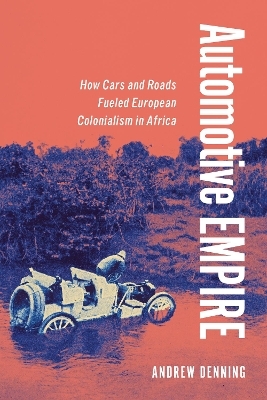
Automotive Empire
How Cars and Roads Fueled European Colonialism in Africa
Seiten
2024
Cornell University Press (Verlag)
978-1-5017-7536-9 (ISBN)
Cornell University Press (Verlag)
978-1-5017-7536-9 (ISBN)
In Automotive Empire, Andrew Denning uncovers how roads and vehicles began to transform colonial societies across Africa but rarely in the manner Europeans expected. Like seafaring ships and railroads, automobiles and roads were more than a mode of transport—they organized colonial spaces and structured the political, economic, and social relations of empire, both within African colonies and between colonies and the European metropole.
European officials in French, Italian, British, German, Belgian, and Portuguese territories in Africa shared a common challenge—the transport problem. While they imagined that roads would radiate commerce and political hegemony by collapsing space, the pressures of constructing and maintaining roads rendered colonial administration thin, ineffective, and capricious. Automotive empire emerged as the European solution to the transport problem, but revealed weakness as much as it extended power.
As Automotive Empire reveals, motor vehicles and roads seemed the ideal solution to the colonial transport problem. They were cheaper and quicker to construct than railroads, overcame the environmental limitations of rivers, and did not depend on the recruitment and supervision of African porters. At this pivotal moment of African colonialism, when European powers transitioned from claiming territories to administering and exploiting them, automotive empire defined colonial states and societies, along with the brutal and capricious nature of European colonialism itself.
European officials in French, Italian, British, German, Belgian, and Portuguese territories in Africa shared a common challenge—the transport problem. While they imagined that roads would radiate commerce and political hegemony by collapsing space, the pressures of constructing and maintaining roads rendered colonial administration thin, ineffective, and capricious. Automotive empire emerged as the European solution to the transport problem, but revealed weakness as much as it extended power.
As Automotive Empire reveals, motor vehicles and roads seemed the ideal solution to the colonial transport problem. They were cheaper and quicker to construct than railroads, overcame the environmental limitations of rivers, and did not depend on the recruitment and supervision of African porters. At this pivotal moment of African colonialism, when European powers transitioned from claiming territories to administering and exploiting them, automotive empire defined colonial states and societies, along with the brutal and capricious nature of European colonialism itself.
Andrew Denning is Associate Professor in the Department of History at the University of Kansas. He is author of Skiing into Modernity and coeditor of The Interwar World. His work has also appeared in The Journal of Modern History, American Historical Review, Technology and Culture, and Environmental History.
| Erscheinungsdatum | 03.06.2024 |
|---|---|
| Zusatzinfo | 43 Halftones, black and white; 14 Maps |
| Verlagsort | Ithaca |
| Sprache | englisch |
| Maße | 152 x 229 mm |
| Gewicht | 907 g |
| Themenwelt | Sachbuch/Ratgeber ► Natur / Technik ► Fahrzeuge / Flugzeuge / Schiffe |
| Geisteswissenschaften ► Geschichte ► Regional- / Ländergeschichte | |
| ISBN-10 | 1-5017-7536-7 / 1501775367 |
| ISBN-13 | 978-1-5017-7536-9 / 9781501775369 |
| Zustand | Neuware |
| Haben Sie eine Frage zum Produkt? |
Mehr entdecken
aus dem Bereich
aus dem Bereich
wie wird man Fachkundiger für Arbeiten an Hochvolt-Systemen im …
Buch | Softcover (2023)
Paul Christiani (Verlag)
CHF 95,15
Technik 1+2
Buch | Hardcover (2020)
Vogel Communications Group GmbH & Co. KG (Verlag)
CHF 179,95
Buch | Hardcover (2022)
Vogel Communications Group GmbH & Co. KG (Verlag)
CHF 109,95


